
Doctoral College Santander Mobility Awards | Mark Stevens Awardee Report

Latest research and knowledge exchange news at Bournemouth University

A Bournemouth University team from the Faculty of Science and Technology visited University of Groningen for FIRST mid-term review. It was a very productive meeting with a lot of effective outcomes for research and knowledge exchange. Dr. Lai Xu and Dr. Paul de Vrieze are FIRST coordinators representing Bournemouth University and the team is pleased to announce that FIRST will continue to move towards a factory of the future for European Union.
If you want to know more about the project and get involved, please contact Dr. Lai Xu or Dr. Paul de Vrieze. You can also follow our social medial links on Facebook, Twitter, Instagram and YouTube Channel.
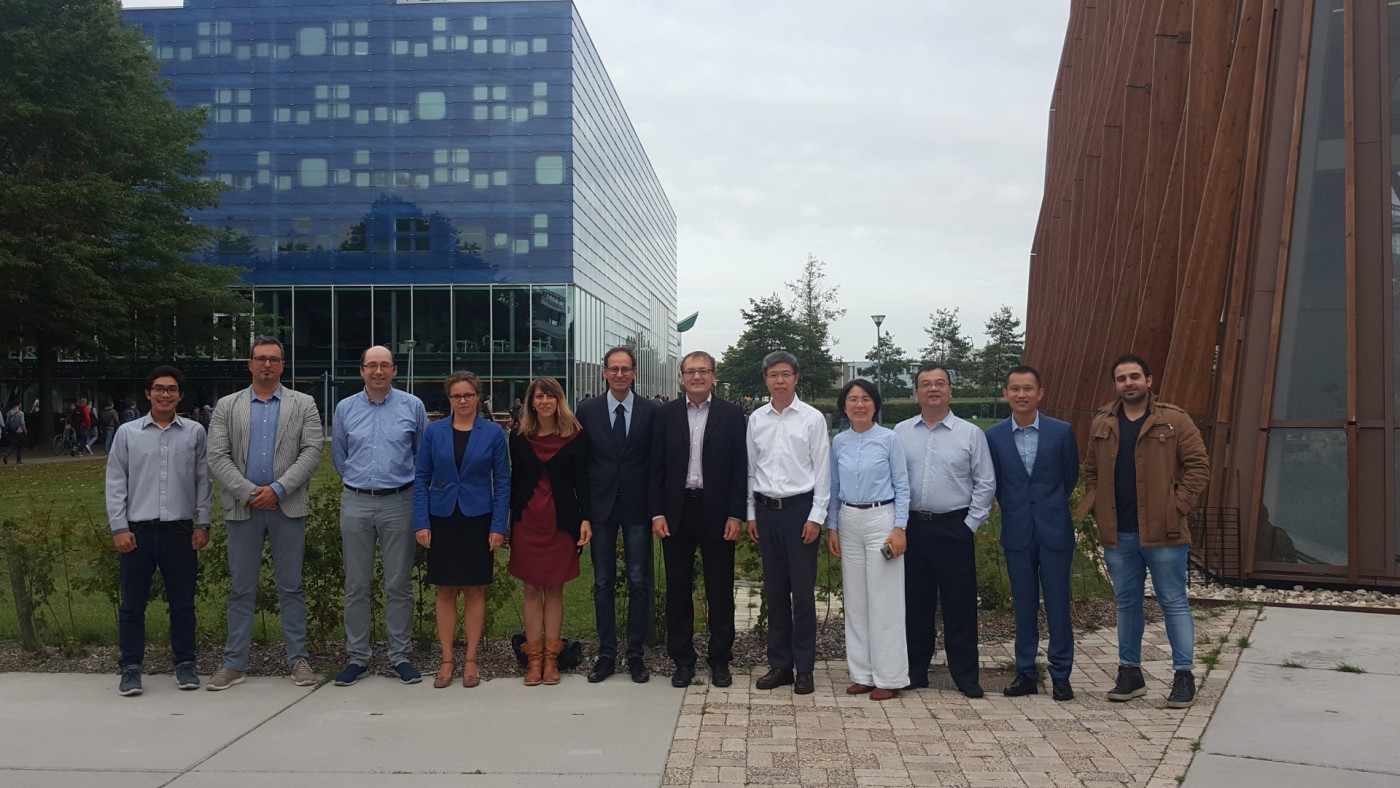
During the mid-term review meeting, the FIRST EU project advisor Irina Elena Tiron giving a talk on RISE projects. A useful instrument for researchers in EU (and beyond).
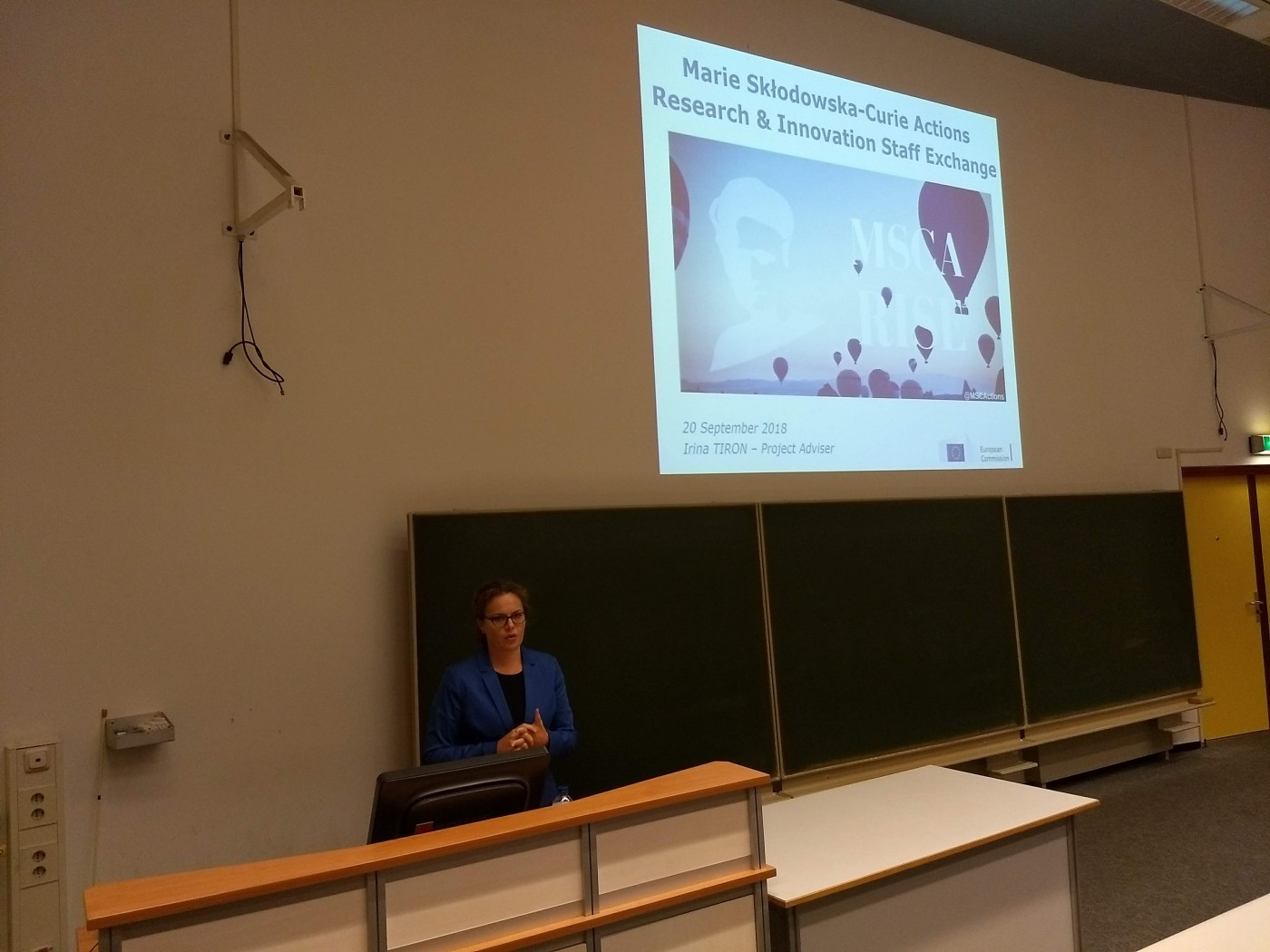
On 17 – 18 September 2018 Natalie Stewart (Doctoral College Research Skills and Development Officer), Thomas Stroud (Doctoral College Resources Administrator) and Emily Cieciura (RKEO Research Knowledge and Exchange Development Framework Facilitator) attended the Vitae Researcher Development International Conference, the largest global event dedicated to researcher development.
With around 400 delegates in attendance, the conference explored the latest policy development, future development in the sector and explored the opportunities and challenges of researcher development.
With an emphasis on how to meet the future development needs of researchers for a wide range of careers in and beyond academia, we came back more informed, connected and motivated to ensure Bournemouth University Postgraduate Research Students and Research Staff are provided with comprehensive, targeted and flexible researcher development programmes.
Three Minute Thesis UK Final
The UK National 3MT® Final was hosted at the conference gala dinner where six finalists from across the UK competed to win the coveted £3k grant to spend on a public engagement activity and a place on the Taylor & Francis Journal Editor Mentoring Programme. This year’s judge’s winner was Owen James, University of Edinburgh, with the winning presentation entitled ‘Human myelin in a dish’ and the people’s choice award went to Jamie Khoo with the emotive presentation ‘But is she pretty? How women respond to beauty ideals’. The 3MT® event is definitely a highlight of the conference; hopefully we can get BU PGRs represented in the coming years. Look out for the internal 3MT® event coming up this year. You can watch all of the semi-finalist 2018 presentations on the Vitae Website here.
Doctoral College Researcher Development Programme
The RDP is complementary to postgraduate research degrees here at BU and offers PGRs flexibility to develop their academic, professional and personal skills as and when required. It supports PGRs in gaining the skills needed to complete their research degree whilst also building on transferable skills for employment, whether in academia or beyond, in an increasingly competitive jobs market.
Offering over 150 on-campus workshops, e-learning, an interactive webinar series, and a range of additional online resources, and various events the RDP mirrors the Vitae Researcher Development Framework (RDF) which enables PGRs to tailor their individual developmental journey.
The RDP is open to all PGRs and, access to view the provisions offered on Brightspace is provided to PGR supervisors.
If you have any questions on the RDP please contact the Research Skills and Development Officers Natalie and Clare (pgrskillsdevelopment@bournemouth.ac.uk).
RKEO Research and Knowledge Exchange Development Framework
The RKEDF offers a range of opportunities for academics at all career stages to develop their skills, knowledge and capabilities in relation to research and knowledge exchange.
Attending the Vitae conference enables us to share in the best practice across the UK and globally, providing the impetus to embrace innovative researcher development approaches. In the last twelve months, for example, BU has launched a new Early Career Researcher Network, including its Brightspace community, seen successful cohorts for the Writing Academy, Research Council Development Scheme, piloted a new career-based pathway, with dedicated developmental support for ECRs, Mid-Career and Professorial researchers, benefited from inspirational external speakers, and hosted over 150 events ranging from funder briefings to STEAMLabs. Following discussion of your development requirements with your line manager and consideration of how the RKEDF can support these needs, the RKEDF is open to all BU academic staff, including those on fixed and PTHP contracts.
The RKEDF also references the Vitae Researcher Development Framework (RDF).
If you have any questions about the RKEDF, please contact Emily Cieciura, RKEDF Facilitator (RKEDevFramework@bournemouth.ac.uk).
Café Scientifique Bournemouth – We run on the first Tuesday of the month.
Cafe Scientifique is a place where, for the price of a cup of coffee or a glass of wine, you can explore the latest ideas in science and technology. Enjoy listening to a short talk before engaging in debate and discussion around that topic.
Join us on Tuesday 6 November from 7.30pm until 9.00pm (doors will open from 6.30pm):
We’ll be joined by Xun He to discuss – Working together: When your mind is in my mind.
Human beings are evolutionary shaped social animals. We often play and work together either independently or aiming at common goals. Have you ever wondered, when we are engaged in group activities, whether we perform everyday tasks in the same way as we do them alone? Recent findings in psychology showed that one person’s cognition and behaviour (such as attention, memory, perception, and action) can be shaped by another person who performs similar tasks in the same environment. But the answer to the question is more complicated than a simple ‘yes’ or ‘no’. This talk will introduce these findings and explain the theories behind the phenomena. You will see psychological experiments in action and be engaged with some tests and discussions.
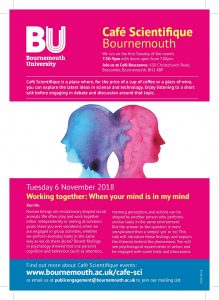
Café Boscanova – 650 Christchurch Road, Boscombe, Bournemouth, BH1 4BP
If you have any questions please do get in touch. You can also follow us on Facebook and Twitter.
Plus, why not send us a request to be added to our Public Engagement mailing list and be the first to hear about all our events and activities.
We look forward to seeing you!
Café Scientifique Team

Places are going fast for our conference next month. See full programme here. If you would like to secure a place please register here.
See you there.
Café Scientifique – Tuesday 2 October- Facing our future self
Bournemouth Café Scientifique is turning 6 on Tuesday 2 October. To celebrate we have a fantastic talk from Dr Curie Scott about changing our attitudes to ageing. We’ll also have Birthday Brownies!
Join us on Tuesday 2 October from 7.30pm until 9.00pm (doors will open from 7.00pm):
Café Boscanova – 650 Christchurch Road, Boscombe, Bournemouth, BH1 4BP
Facing our future self

Dr Curie Scott
One in five people alive today will reach their 100th birthday. You are going to grow old but have you thought about it? Ageing is a taboo subject and older people are often stereotyped and overlooked. Dr Curie Scott invited people over 60 and students from Health & Social Care professional courses to four drawing workshops. Come and hear how drawing about ageing made a startling difference to their current lives. In terms of ageing, we cannot separate ourselves from our future older self, however much we want to do so. ‘They’ are the ‘we’ of the future.
If you have any questions please do get in touch. You can also follow us on Facebook and Twitter.
Plus, why not send us a request to be added to our Public Engagement mailing list and be the first to hear about all our events and activities.
We look forward to seeing you!
Café Scientifique Team
I recently had the opportunity to apply for a grant as principal investigator. The reason for writing this post today is to say thanks to everyone involved, including the RKEO staff, the Co-investigators (Paula Callus in particular), the partner institutions but also all colleagues who gave us suggestions, supporting and helping also if not involved (Isabella Rega and Richard Berger were some of these).
On reflection, I would have done all of it differently. More time was needed (possibly not when on Annual Leave and not night time), partners need to be in place well before the call is out, reference letters cannot be asked for last minute, etc. I made all (or almost all) the mistakes above, but I had a very clear idea about the project and I felt surrounded by enthusiastic colleagues who were happy to share their expertise with me. I now know I have still a lot to learn and I can’t wait for the next opportunity.
A good point was to take notes which will be used for next grant applications. Somehow it does not matter if we will get the funding at this first attempt, we are looking forward to improving the application and the project itself, which will require more research. Yes, applying for grants is not a boring task, there is a lot of research involved which brings new ideas and opens up opportunities, whether you get the funding or not.
I hope this post will be read as a positive gentle push to apply for grants and not only because it’s the Institution in need of more grants applications but because the process itself is incredibly enriching. I hope my colleagues enjoy their future grant applications as much as I did.
a+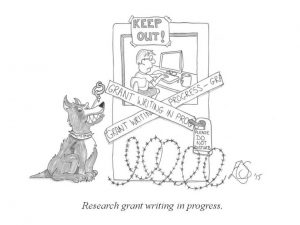

There is an increasing emphasis on the need for researchers and sponsors to publish, and disseminate, the results of the clinical studies that they conduct. Timely disclosure of results is important ethically, morally, in the interests of research integrity and from a waste reduction perspective.
Dissemination of results, whether favourable or not, also achieves transparency – increasingly important from the perspective of the recent introduction of the GDPR.
The National Institute for Health Research (NIHR) have signed-up to the WHO’s joint statement on public disclosure of results from clinical trials. The policy sets out the expectations and support on offer in order for research communities to comply. The draft policy is available to read, with a quick survey open until 21st September, for you to have your say.
BU has access to the ClinicalTrials.gov system – get in touch for access and for the opportunity to register your study and results in the public domain.
Profs Matthew Bennett and Marcin Budka have just published the textbook Digital Technology for Forensic Footwear Analysis and Vertebrate Ichnology with Springer.

“There is no branch of detective science which is so important and so much neglected as the art of tracing footsteps.” Sherlock Holmes, Study of Scarlet.
Despite the fictional nature of Sherlock Holmes this statement rings true today. The study of footwear is neglected in modern forensic practice and does have much to offer. What it needs is an injection of technology and associated modern analytical tools. These tools are emerging from the digital revolution currently transforming vertebrate ichnology. Ichnology is the discipline of earth science which focuses on the study of trace fossils such as footprints. This book draws upon both disciplines (geology [ichnology] and forensic science) to show how the two have much to learn from each other especially with regard to the digital capture and analysis of footprints and footwear evidence.
This innovative book which is the culmination of research/innovation funded by the Natural Environment Research Council (NERC) and HEIF provides the practitioner with field and laboratory methods necessary for the collection, analysis and presentation of three-dimensional tracks (footprints) whether from a crime scene or a geological/archaeological excavation. It shows students, researchers and practitioners how to collect and analyse 3D data and take advantage of the digital revolution transforming ichnology. The book forms a natural methods focused complement to the successful text Fossilised Locomotion published by Springer 2014 and written by Professor Bennett.
The book is an illustration of Fusion in action combining professional practice, research and teaching. The team’s work is supported by the Home Office and National Crime Agency as well as several police forces and forensic units throughout the UK. Some of the contents have been co-created with students at BU and the volume will be used in teaching on a range of forensic science programmes at BU.
The National Institute for Health Research are in urgent need of psychiatrists and psychologists to peer review funding applications.
See the original tweet here advertising this opportunity, and how to apply here*.
*The link takes you to how to apply as a professional peer reviewer, from any clinical speciality. You can review for the NIHR for professional development (amongst other initiatives), and they need a wide range of expertise:
Home Instead is launching the Stay Nourished initiative in consultation with Professor Jane Murphy from BU’s Ageing & Dementia Research Centre.
See full article below:
https://www.express.co.uk/life-style/life/1000975/one-million-pensioners-summer-eating-every-meal-alone?platform=hootsuite
Click links for programme and registration form, spaces limited!
Programme for SIXTH Annual Wessex CRN and Regional BGS 18 Sept 2018 with sponsors v3
REGISTRATION FORM for 6th annual Wessex CRN Research BGS MEET
Sascha Dov Bachmann (Associate Professor in International Law (Bournemouth University and Director of BU’S CROLS) and extraordinary Associate Professor in War Studies (Swedish Defence University, SWE) spoke on Hybrid Warfare and Lawfare in Brussels this November and Andres Munoz (NATO SHAPE, LEGAL OFFICE) submission RUSSIAN LAWFARE CAPABILITIES AS A THREAT TO THE ARCTIC has been included and cited in the House of Commons Defence Committee’s 12th Report of Session 2017-2019
Sascha Dov’s work is repeatedly referenced on the NATO legal virtual desktop, thereby demonstrating the high-impact and publicity which his research generates. His research on Hybrid Warfare and the role of Cyber and Lawfare has been identified as 3* plus impact in the last institutional stocktaking exercise at BU and is being developed further. He has been invited to join NATO SHAPE as visiting Research Fellow.

The HRA have recently released a blog post, written by their Director of Policy, Juliet Tizzard surrounding Research waste and ensuring transparency. The blog goes into the importance of ensuring that research results, even if unfavourable, are published and disseminated appropriately.
You can read the blog here.
If you are running your own clinical research then get in touch with Research Ethics to discuss registering your study and for assistance with this task.
Dr Sascha Dov Bachmann, Associate Professor in International Law (BU) and War Studies (Swedish Defence University), acting Director of BU’s Centre for Conflict,Rule of Law and Society has joined forces with Professor Louis de Koker and Professor Pompeu Casanovas from La Trobe University, Melbourne, Australia to convene the conference
Global peace and security has seen the arrival of new security threats in the form of hybrid threats and cyber-attacks.
This symposium provides a platform for the discussion of a new form of warfare, namely ‘hybrid warfare’. Hybrid war is the use of a range of non-conventional methods (e.g. cyber warfare and lawfare) in order to disrupt, discourage and disable an adversary’s capabilities without engaging in open hostilities and may use the full range of military and non-military options for achieving its strategic objectives. Such hybrid warfare might include aspects of ‘cyber terrorism’, ‘cyber war’ and cyber-based ‘information operations’, a topic of particular interest given Russia’s ‘Ukrainian Spring’, the continuing threat posed by radical Islamist groups in Africa, the Middle East and the Asia-Pacific region as well geopolitical shifts.
The interdisciplinary symposium will discuss military doctrines, new and traditional approaches to war and peace and its perceptions, the use of cyber warfare, the use of mass media communication to meddle in internal state affairs, including impact on state elections and public sentiment, as well as the use of lawfare (the strategy of using – or misusing – law as a substitute for traditional military means to achieve a war-fighting objective) to achieve military goals in a non-kinetic way and the use of various means to disrupt a nation’s economy, public services and national interests.
At the heart of the symposium stand the questions of how to increase resilience and whether responses to such hybrid threats need to change in the future.
This seminal conference brings together academics and military professionals from the region and beyond to discuss new security challenges from a Asia-Pacific and especially an Australian perspective.
Deadline for submissions: 31 October 2018
Symposium Date: 25 – 26 March 2019
Place: La Trobe University, Melbourne, Australia
Proposals must be sent by email to the Lead Convenor: Professor (AP) Sascha Dov Bachmann (email: sbachmann@bournemouth.ac.uk).
Convenors:
Dr Choe, from the Faculty of Management provided a public lecture on ‘Spiritual Tourism and Sustainable Development’ at Chiang Mai University (CMU), Thailand.
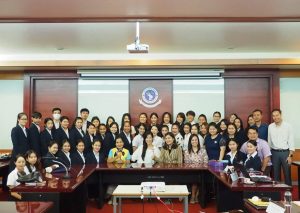
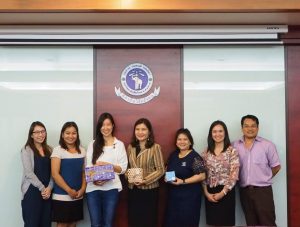
Research staff at the Center of Tourism Research & Development, Social Research Institute at CMU kindly helped organise the event and added a very warm welcome and hospitality. They invited CMU research staff and students as well as staff/students from other universities in Chiang Mai. Their promotional efforts attracted a big crowd!
Dr Choe passionately shared her research ideas, data collected from Chiang Mai, her observations and interpretations. Lively discussions including helpful feedback and questions from local academics and students made the session very interesting, productive and meaningful.
Dr Choe suggested that other Southeast Asian destinations can learn from Chiang Mai’s successful push for spiritual and sustainable tourism and the management programmes. For example, Luang Prabang in Laos has similar tourism attractions such as numbers of historically significant Buddhist temples. However, they do not offer meditation retreat/’monk chat’ programmes that Chiang Mai offers to ‘spiritual travellers’ in unique and effective ways. Dr Choe also emphasised the ASEAN’s regional cooperation for future tourism development.
Dr Choe and research staff at Social Research Institute and Dept of Tourism, Faculty of Humanities at CMU have started collaborating on a number of projects. Updates will be posted on the BU Research Blog, so stay tuned 🙂
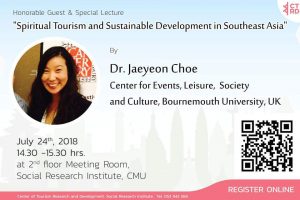
On the 13th July 2018, the Ageing and Dementia Research Centre (ADRC) hosted a free half-day workshop for dementia practitioners and academics interested in understanding how digital gaming technology can be used to support the well-being of people with dementia and their care partners.
The event was attended by people from a range of professional backgrounds including care home staff, day centre Activity Coordinators, community volunteers, researchers and local Government. The morning session provided them with the opportunity to listen to presentations from:
During the afternoon session, the attendees were provided with a more ‘hands-on’ opportunity to use the applications and talk to the researchers in more detail about how the technology could be incorporated within their practice. These sessions were facilitated by Bournemouth University students Amy Dytham, Amy-Jane Pegler and Olivia Bryant who have been involved as Research Assistants in a number of the projects.
The event provoked some interesting questions and seemed to raise awareness of how technology can be used in the future care of people with dementia; both in providing those living with the condition with better opportunities for meaningful leisure activities and those supporting them with a more informed understanding of what it may be like to live with a dementia. The event also provided a great networking opportunity for the attendees, and discussions regarding future collaborations are already underway.
For more information on the event or for a copy of the presentations that were delivered on the day please contact Ben Hicks on bhicks@bournemouth.ac.uk.
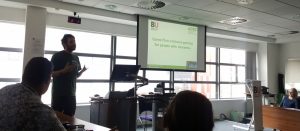
Ben Hicks discussing the HEIF funded Game Plan project
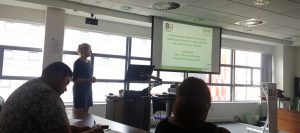
Laura Wade discussing A Walk Through Dementia

Phil Joddrell discussing the development of the AcTo Dementia website
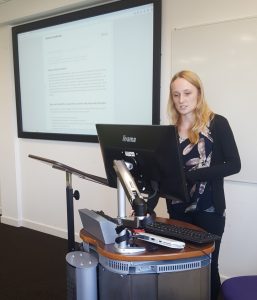
Amy Dytham leading a training session on the AD-Gaming platform

Some thought provoking discussions
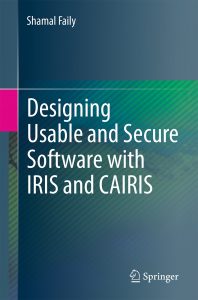
Shamal Faily has just published the textbook Designing Usable and Secure Software with IRIS and CAIRIS with Springer.
The book was written to help practitioners, be these UX designers, security architects, or software developers, ‘build in’ security and usability. The ACM Code of Ethics states that True security requires usability – security features are of no practical use if users cannot or will not use them. This book explains how usable and secure software can be designed using the IRIS framework and the CAIRIS software platform, and provides real case studies where security and usability is incorporated into software designs at an early stage. This is something most people agree should be done, but few people give advice on how to do it. This book helps fill this gap.
The book also helps educators and students by providing a resource for a course on Security by Design. As explained in the preface, this book was written to support our undergraduate and postgraduate Security by Design unit at BU, and pointers are included on how different parts of this book can support this or similar courses.
More information about this book can be found here. As the book will be used to support teaching at BU, soft and hard copies should be available from the library soon.